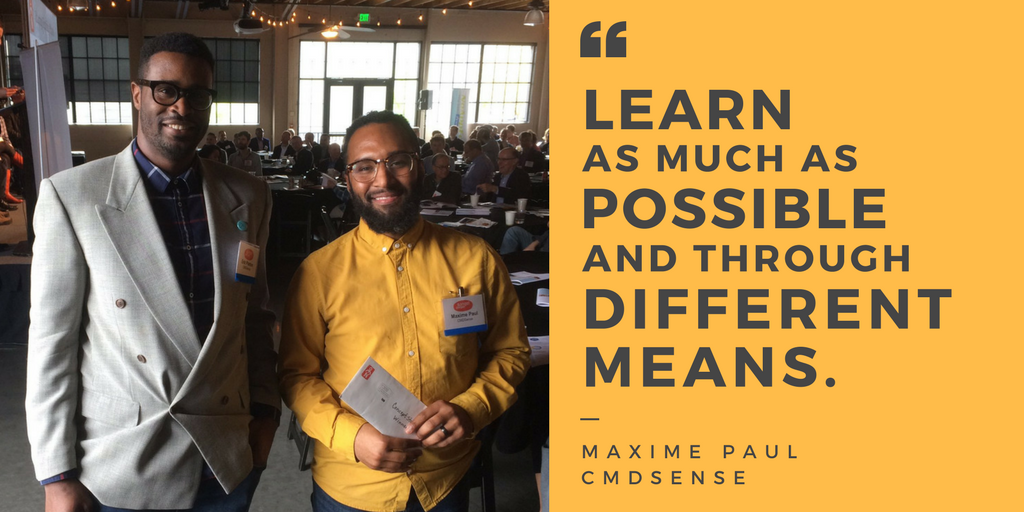
Rising StarMaxime Paul of CMDSense Saves Construction Managers Headaches, Money, and Time
A surveyor’s job relies on taking precise land measurements, but the current tools available are anything but precise. Maxime Paul, the Concept Stage winner of OEN’s 2017 Angel Oregon Program, saw this pain point and decided to do something about it.
His company, CMDSense, helps surveyors do their jobs better, but the ramifications are potentially far larger. By dramatically reducing construction project costs, for instance, CMDSense may even help cities like Portland build more affordable housing.
Here’s more from Maxime:

What was the spark that inspired the birth of your concept? My dad was a surveyor for almost 30 years in the military, and then as a civilian. He called me one day and was complaining about a construction project that he was surveying in St. Louis. He was telling me how time-consuming, tedious, and inaccurate the process was. I asked him more about what he did and saw that there was a better way to survey. From there, I put together some devices and an initial prototype, which I brought him for Christmas that year. That was the initial spark for this idea, to solve the problem that my Dad and many other surveyors deal with on an everyday basis.
What problem does it solve? We increase accuracy and cut costs by dramatically reducing the human error, calibration time, and workers needed for operation. We also ease the transfer of data to and from our system. This makes it easier to for anyone on the construction project to pick up our system and get the surveying data they need.
How did you come up with the name? We had a name before that was pretty obvious, but we were worried that “some big companies” might try to attack us for having a similar name or a piece of our name. So we took some time to list out a bunch of potential names. We got feedback from a number of people to narrow down the top names that reached the essence of who we are now and will be in the future, while telling a story. From this process, the highest ranking name was CMDSense (pronounced: Command Sense) or Construction Management Diagnostics with Sensors.
How are you different from your competition? No one else is doing what we’re doing. The current systems are more complex iterations of the same surveying tools invented almost 500 years ago. Nobody has looked at surveying from its first principles to identify the problem that surveying is solving and create a solution with the current tools available to solve it.
As an entrepreneur, what keeps you up at night? Getting customers faster, and making sure that we can make them happy and retain them. We have a very customer-centric focus and that keeps us an track, but it is also the most difficult thing to handle.
What is your #1 piece of advice for a budding entrepreneur? My #1 piece of advice for a budding entrepreneur is to keep learning. Learning comes in many forms: schools, books, websites, or from talking to and working with other people. This has helped me come up with creative solutions and solve the multitude of problems I face on a daily basis as an entrepreneur. Learn as much as possible and through different means. Through just talking to a person (maybe while having a few alcoholic drinks), I can learn something new that can help me and my business get closer to our goals.
What is the #1 book you would recommend for a budding entrepreneur? I think a book that started a lot of my journey and learning was the first book in a series from the Critical Thinking Foundation called Analytical Thinking. My wife gave me this book maybe six years ago. It was a small pamphlet, which was very digestible for me. At the time, I didn’t really read at all. Analytical Thinking not only totally opened my eyes to reading outside of school, but also to how to think more creatively (and in a more procedural way). I ended up ordering and reading the entire collection of books from the Critical Thinking Foundation and it expanded my reading to more and more books. It also gave me the tools to identify many of my first startup ideas.
When you were a child, what did you want to be when you grew up? I wanted to be an R&B singer when I was growing up. I thought I was going to be the next Usher. I was always dancing, listening to music, and singing. I even started choreographing for various groups in high school and college, but eventually figured out that my path wasn’t as an R&B star.
What’s the best thing about being an entrepreneur? The flexibility of what to do, creativity involved, and the unbridled growth. I don’t like to be boxed in or have rules that limit what I can or can’t do. Entrepreneurship can be very freeing, but also scary because there are so many options available. Now I feel comfortable with that ambiguity. I love that creativity is valued and encouraged in entrepreneurship, it goes along very closely with having flexibility in the ways that problems can be solved. Finally, from all of that flexibility and creativity comes immense amounts of learning and growth. I can constantly create or refine new paths to success and ways of thinking. As an entrepreneur, I feel most like myself.
